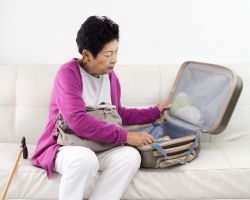Countdown to knee replacement surgery

You can help make your total knee replacement surgery a success. Pave the way for an easy recovery with this timeline of simple pre-op steps.
Once you've decided to have knee replacement surgery, it's time to start preparing for the procedure. The steps you take to get ready for surgery can help set you up for a positive outcome.
This simple timeline can help you effectively plan for surgery.
A few months before surgery: Get in shape
Being as fit as possible can reduce your risk of complications and shorten your recovery time, according to the American Academy of Orthopaedic Surgeons (AAOS). Things you can do to get your body ready include:
Start pre-hab. Exercising in the weeks leading up to surgery can set you up for success. This pre-hab can stabilize pain levels before surgery and then help you bounce back faster after the operation, according to the Arthritis Foundation. Talk to your doctor about working with a physical therapist to create an exercise routine you can do at home.
Quit tobacco. If you smoke, quit (or at least cut down) before surgery. Smoking affects blood circulation, delays healing, slows recovery and can increase the risk of infection, according to the AAOS. Keep your doctor updated on your tobacco use.
Manage your weight. Carrying extra pounds can put additional stress on your new joint. In some cases, your doctor may recommend a weight-loss program.
A few weeks before surgery: Make a plan
Work with your care team and loved ones to figure out what you need to do before and after surgery.
Attend pre-op appointments. In the weeks leading up to surgery, you'll need a general medical evaluation. You might also need pre-op tests, such as blood tests, an electrocardiogram or an x-ray. All of this information will help your care team assess your health, determine the right anesthesia and develop a personalized plan for your procedure.
These appointments are also a good time to make sure your surgery team knows about any controlled substances you take, including opioids.
Plan for your recovery. If you live alone, ask a friend or family member to stay with you for several days. If this isn't possible, ask your doctor for information about specialized rehabilitation facilities near you. If you're at home, you'll also need to plan ahead for meals and for rides to post-op appointments.
Get your home ready. The changes you need to make depend on your home. Consider the following:
- Make sure items you use often—like the remote, tissues or medications—will be within easy reach.
- Remove any throw rugs that could cause you to slip or trip.
- Shop for things that can make life easier after surgery, like a long-handled shoehorn, a grabbing tool or a soft shoulder bag for carrying things around.
- Try out a walker, cane or crutches to see how easy it is to move through your home using them. Rearrange furniture as needed.
- Modify your bathroom with things like a shower chair, gripping bar or raised toilet seat.
In the days before surgery: Make last-minute preparations
Pack a hospital bag. A small bag with necessities can make your hospital stay more pleasant. Consider including slippers with nonskid soles, a robe, and a lightweight shirt or camisole to wear under your hospital gown. You'll also want a hairbrush, any medications you take regularly, and cases for items like dentures or glasses. Have a comfy outfit you can wear home too.
Avoid alcohol. You shouldn't drink for at least 48 hours before surgery, according to the AAOS.
Follow your surgeon's instructions. These may include things like taking a shower or bath the night before surgery, avoiding food and drink, and removing makeup or nail polish.
Reviewed 9/5/2024
